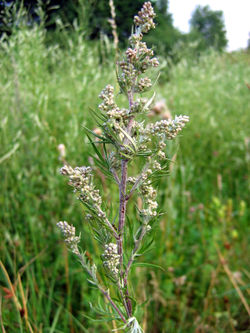Artemisia vulgaris
From Wikiwel
Other Names : Absinth, Absinthe, Absinthe Suisse, Absinthii Herba, Absinthites, Absinthium, Ajenjo, Alvine, Armoise, Armoise Absinthe, Armoise Amère, Armoise Commune, Armoise Vulgaire, Artesian Absinthium, Artemisia absinthium, Common Wormwood, Grande Absinthe, Green Ginger, Herba Artemisae, Herbe aux Vers, Herbe d'Absinthe, Herbe Sainte, Indhana, Lapsent, Menu Alvine, Qing Hao, Vilayati Afsanteen, Wermut, Wermutkraut, Western Wormwood, Wurmkraut, Mugwort, Bijvoet, Beifuß
Wormwood is an herb. The above-ground plant parts and oil are used for medicine.
See also :
Special Precautions of Artemisia vulgaris
- Don't confuse with Wormseed end Not to be confused with Artemisia annua (Sweet wormwood).
- Wormwood is safe when taken in the amounts commonly found in food and beverages including bitters and vermouth, as long as these products are thujone-free. Wormwood containing thujone is UNSAFE when it is taken in large amounts or over a long period of time. Thujone can cause seizures, muscle breakdown (rhabdomyolysis), kidney failure, restlessness, difficulty sleeping, nightmares, vomiting, stomach cramps, dizziness, tremors, urine retention, thirst, numbness of arms and legs, paralysis, and death.
- Not enough is known to rate the safety of using wormwood topically.
- Pregnancy and breast-feeding: Wormwood is LIKELY UNSAFE when taken by mouth in greater than food amounts. The concern is the possible thujone content. Thujone might affect the uterus and endanger the pregnancy. It’s also best to avoid topical wormwood, since not enough is known about the safety of applying wormwood directly to the skin. If you are breast-feeding, don’t use wormwood until more is known about safety.
- Allergy to ragweed and related plants: Wormwood may cause an allergic reaction in people who are sensitive to the Asteraceae/Compositae family. Members of this family include ragweed, chrysanthemums, marigolds, daisies, and many others. If you have allergies, be sure to check with your healthcare provider before taking wormwood.
- A rare inherited blood condition called porphyria: Any thujone present in wormwood oil might increase the body’s production of chemicals called porphyrins. This could make porphyria worse.
- Seizure disorders, including epilepsy: Wormwood contains thujone, which can cause seizures. There is concern that wormwood might make seizures more likely in people who are prone to them.
- Medications used to prevent seizures (Anticonvulsants) interacts with wormwood.
The Health Benefits and uses of Artemisia vulgaris are
Wormwood oil contains the chemical thujone, which excites the central nervous system. However, it can also cause seizures and other adverse effects.
- Loss of appetite.
- Indigestion.
- Gallbladder disorders.
- Wounds.
- Insect bites.
- cancer : It is used in Moxibustion treatments for cancer
- anti-inflammatory.
- Worm infestations.
- Low sexual desire.
- Spasms.
- Sedative
- Increasing sweating.
- used in some alcoholic beverages. Vermouth, for example, is a wine beverage flavored with extracts of wormwood. Absinthe is another well-known alcoholic beverage made with wormwood. It is an emerald-green alcoholic drink that is prepared from wormwood oil, often along with other dried herbs such as anise and fennel. Absinthe was popularized by famous artists and writers such as Toulouse-Lautrec, Degas, Manet, van Gogh, Picasso, Hemingway, and Oscar Wilde. It is now banned in many countries, including the U.S. But it is still allowed in European Union countries as long as the thujone content is less than 35 mg/kg. Thujone is a potentially poisonous chemical found in wormwood. Distilling wormwood in alcohol increases the thujone concentration.
- Source of Inulin
